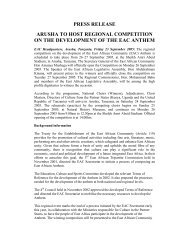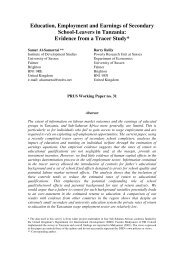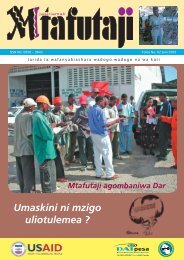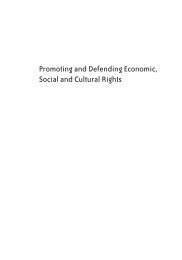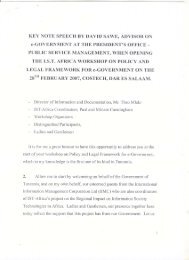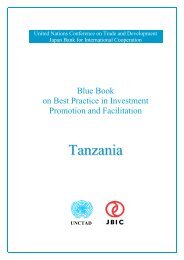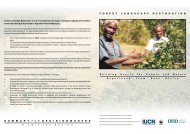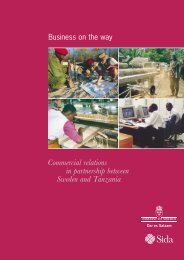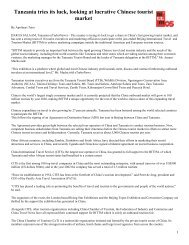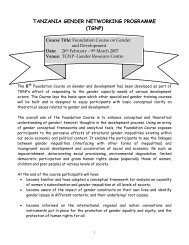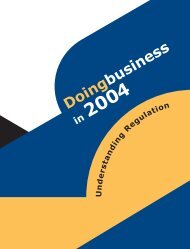Financial sector development - Sida
Financial sector development - Sida
Financial sector development - Sida
Create successful ePaper yourself
Turn your PDF publications into a flip-book with our unique Google optimized e-Paper software.
eduction. To this end, <strong>Sida</strong> has developed a special Action Programme which aims at<br />
improving the living conditions of the poor. In the Action Programme, the important link<br />
between economic growth and sustainable livelihoods of the poor is emphasised. It is<br />
important that the assistance to financial <strong>sector</strong> <strong>development</strong> projects is analysed in this<br />
context. Obviously, financial <strong>sector</strong> <strong>development</strong> projects are usually not directly geared<br />
towards the poorest strata of the population. However, as will be shown in the forthcoming<br />
analysis, well-functioning and efficient financial markets are instrumental in order to<br />
achieve sustainable growth. Against this background, it appears that financial <strong>sector</strong><br />
<strong>development</strong> projects generally contribute to alleviating the living conditions for the poor,<br />
at least in a longer perspective.<br />
It should, nevertheless, be underlined that economic growth is not a sufficient condition for<br />
the poor to become better off. A fair distribution of income and wealth is also required in<br />
order to make progress in the fight against poverty. In this respect, it is important to create<br />
more jobs and ensure improved opportunities for peasants and self-employed. Here,<br />
financial <strong>sector</strong> <strong>development</strong> projects geared directly towards the poor population can be<br />
very useful. Giving access to sustainable systems for provision of microfinance and<br />
opportunities for small savings can be of vital importance for directly improving the living<br />
conditions of the poor. Experience from such microfinance schemes in various countries<br />
shows that also the very poor are ”bankable”. These encouraging experiences explains<br />
the special attention given in this report to the role of microfinance and the services of the<br />
informal financial <strong>sector</strong>.<br />
Equality between women and men is a specific dimension of the struggle against poverty.<br />
<strong>Sida</strong> has also established an Action Programme for Promoting Equality Between Women<br />
and Men. In this Action Programme, three main structural and systemic causes of gender<br />
inequality are identified. One of these is the disparities in "equal participation in economic<br />
decision-making and economic independence". This is certainly true for access to financial<br />
services. Formal and informal constraints often exclude women from such services. Apart<br />
from being a violation of women's human rights, it is also economically inefficient.<br />
Experience from microfinance projects has shown that women generally are more reliable<br />
when it comes to taking care of an economic activity and repaying loans. Excluding<br />
women from financial services imply that a number of viable economic activities would not<br />
be realised despite their pay off. As a consequence job opportunities and income<br />
generation are not realised.<br />
The link between financial <strong>sector</strong> <strong>development</strong> and the objective to defend human rights<br />
and democracy is less clear. However, it follows from this objective that equal<br />
opportunities to financial services, such as access to credits, should be ensured in the<br />
<strong>development</strong> process. Hence, no groups or individuals should be excluded from access to<br />
financial services owing to their gender, ethnic belonging, religion, etc.<br />
Similarly, the link between financial <strong>sector</strong> <strong>development</strong> and the objectives to ensure a<br />
sustainable <strong>development</strong> is rather remote. <strong>Financial</strong> <strong>sector</strong> <strong>development</strong> is in itself unlikely<br />
to affect the environment. To the extent that financial <strong>sector</strong> <strong>development</strong> leads to<br />
increased investment activity, a case could be made that it might bring about more stress<br />
on the environment. In this respect, it should be made clear that the composition of<br />
investment which is relevant rather than the absolute investment level. The investment<br />
composition is determined by the relative prices on products and inputs as well as by the<br />
knowledge about, and access to, modern production techniques. These factors can<br />
largely be affected by responsible government policies, outside the scope of the financial<br />
12



